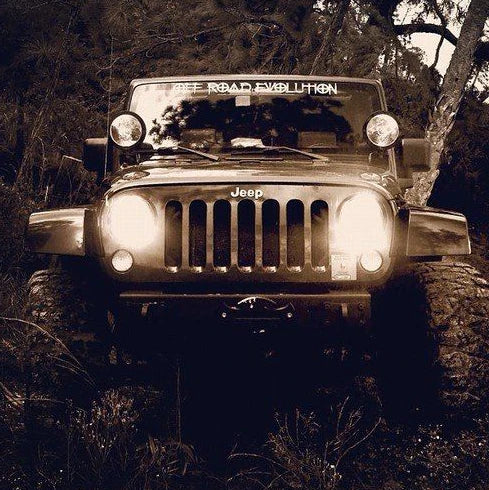Jeep Wrangler Overheated Engine Hacks

Introduction
More than just a matter of comfort, maintaining the engine temperature of your Jeep Wrangler is essential to assuring peak performance and the durability of your Jeep. Let's dig into the world of Jeep Wrangler engine cooling hacks in this complete engine care guide article. We've got you covered in everything from comprehending the nuances of your engine to investigating cutting-edge cooling techniques.
Understanding Your Jeep Wrangler Engine
Understanding the engine in your Jeep Wrangler is essential for efficient maintenance and performance enhancement. Your Wrangler's engine anatomy includes complex parts like the radiator, water pump, and cooling system. these parts are the beating heart of your jeep. Together, these components control temperature, avoid overheating and guarantee maximum efficient performance.
Anatomy of a Jeep Wrangler Engine
To avoid an overheated Jeep engine a driver must learn the common anatomy of the engine by dissecting the components, including the radiator, and water pump, Understanding the structure of your Wrangler's engine gives you knowledge of its weaknesses and strengths. Additionally, by recognizing commonly occurring overheating causes like low coolant levels or exhausted components, you gain the ability to solve the problems beforehand. With this knowledge, you may prevent problems before they arise and extend the life of your Jeep's engine while taking pleasure in worry-free off-road excursions.
Common Overheating Triggers
Let’s learn about the common triggers that lead your Jeep engine to overheat,
- Insufficient Coolant or Contaminated Coolant
- Defective thermostat
- Faulty radiator
- Malfunctioning Water Pump
- Faulty Gasket
- Faulty Spark Plug
When any vehicle overheats first thing that comes to mind is low levels of coolant. Insufficient coolant can be because of jeep owners' low maintenance or forgetting to refill the coolant on time. The cause of low coolant levels is radiator leakage or the radiator's broken pipe.
A malfunction of the water pump which circulates coolant to the engine can be the reason for the overheating of your Jeep. The water pump is the part that becomes rusty after a long period it can leak from the seals and loose coolant.
A faulty gasket can be the reason for an overheated engine gasket separating water and oil in the engine. Gasket failure will result in contaminated coolant. Last but not least a defective thermostat lets the driver know about the engine temperature or the thermostat doesn’t reach the optimal temperature which can lead to an overheated engine. An overheated engine also damages the spark plug that operates your Jeep Wrangler headlights and Jeep taillights.
You can avoid these by following a routine maintenance engine by routine oil change, proper engine servicing, and maintaining the radiator’s coolant levels checked.
What to do if my Jeep Wrangler is Overheated?
- Although it might appear easy, it takes a lot of effort to keep your engine cool when the air conditioner is running. Turn off everything to try to cool things down naturally.
- If that doesn't work, start the engine AC and elevate the heat. Although it could make you unsettled, transferring heat from your engine and bringing it into the cabin of your Jeep will lessen the load on the engine.
- Use less brakes! It is common knowledge that friction increases heat. Additionally, the operation of the engine it performs to slow down and speed up the vehicle in combination with the friction of your brakes can result in additional heat being generated. To refrain from adding heat to a steaming affair.
- Park your Jeep and cranking the engine. Engine revving can occasionally boost the water pump's activity and aid in cooling the engine. Limit your use of this. If you don't notice results right away, you should probably consider another course of action.
- Already bubbled up? When it happens, stop your Jeep. Open the hood and exit the vehicle. Before you consider starting your Jeep again, it will require some time to cool down. You need to add more coolant in the radiator, before checking and refilling the coolant levels in an overheated engine. Make sure the engine is EXTREMELY cool!
- If your temperature gauge keeps going into the red regardless of rest, you need to call a towing service or a friend to help you with your vehicle.
Do’s & Don’ts for an Overheated Jeep:

Do’s for an Overheat engine:
- As soon as it is safe to do so, stop your Jeep and park it.
- If the outside temperature is high, open the windows. If your engine unexpectedly overheats while you are driving, find a safe spot to stop and try a few simple solutions.
- If you make frequent long trips with your Jeep Wrangler have the following tools handy with you:
- Emissions Analyzer
- Power Circuit Probe
- Cooling System Pressure Testing
- Antifreeze Funnel
- Diagnostic Scan Tools
- If your engine overheats and the cause is low coolant and the car has cooled down for at least 30 minutes, keep extra coolant and water in the trunk and add these to the engine.
- Turning off the air conditioning and turning up the heat will help direct heat away from the engine and toward the cabin, which may sound counterintuitive.
- To ensure there are no obstructions in the channels or coolant contamination, do routine coolant flushes and changes.
- Another precaution to avoid overheating is opting for an after-market Jeep front grill which will allow a proper air flow to the engine and improve it’s performance.
Don’ts for an Overheat engine:
- If your Jeep's engine overheats while driving, do not force it to the next service station.
- Do not quickly lift the hood to avoid being burned by hot steam or smoke.
- Pouring cold water is a bad idea on a heated radiator since the quick temperature shift will harm your radiator or create temperature-induced damage.
- Even if it occurs infrequently, do not ignore the engine heating problem as it will damage your Jeep's performance.
Conclusion
To conclude Jeep Wrangler engine cooling is necessary for the overall health of the vehicle and its performance. In this article, we have covered a variety of tactics and strategies to keep your Wrangler cool on all of your off-road or city journeys. Keep in mind that emphasizing engine health and routine Jeep services and maintenance will result in hassle-free Jeep adventures or avoiding the hazards of heated Jeep engines. Implementing these tips and tricks, you can enjoy a smoother, cooler ride for any emerging overheated engine situation. Stay cool and fearlessly explore the world in your Jeep Wrangler.
